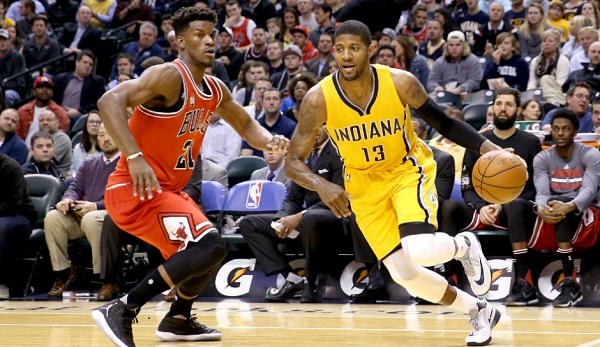
The current proliferation of many of the NBA’s biggest superstars in a few markets, LeBron, Kyrie Irving and Kevin Love in Cleveland, Kevin Durant, Steph Curry, Klay Thompson and Draymond Green in Golden State, Chris Paul and Blake Griffin in Los Angeles, is bittersweet for the league and for your average NBA fan. On one hand, it leads to a clear lack of parody throughout the NBA and limits the amount of competitiveness as there are usually only a couple teams with any real shot at a championship. On the other hand it probably increases ratings and national interest and makes more money for the league as a whole, I mean who isn’t psyched out of their mind for the impending Cavaliers-Warriors trilogy coming this June?
The super team era of the NBA that we are in began in the summer of 2007 when the Celtics acquired Kevin Garnett and Ray Allen to accompany their star Paul Pierce, it then ratcheted up with the infamous “Decision” by LeBron James in 2010. It has started a new dynamic in the sport where the players have more control over the direction of the league. Their ability to make large sums of money beyond their NBA contract and the ability to build their brand wherever they choose to play, has made it easy for them to cohort amongst and form super alliances to win titles and become even more marketable.
The NBA has taken note of this trend and as much as business is booming and the league might be in better shape than it has ever been, the commissioner, the league and the owners for the 25 teams or so who haven’t benefited from this trend would like to see it end and would like to live in a world where there is more opportunity for all teams to compete for an NBA title.
In reality that will always be a pipe dream as the NBA is a star driven league where one player can greatly affect the outcome of a game on his own. There are at most 8-10 players in the league at one time who truly have the special talent to be able to lead a team to an NBA title and every championship team over the past 40 years has had a superstar with the exception of the 2004 Pistons which had five all-star caliber players and quite possibly the best starting lineup top to bottom that we have ever seen.
Still in an effort to keep superstars from fleeing from the team that drafted and built their franchise around them, the NBA has enacted a veteran’s designation rule in the terms of the new collective bargaining agreement which takes shape after this season. It gives players an incredible amount of incentive to stay put when they hit free agency.
This greater incentive is a result of the Designated Player Exception Rule.
Here is a breakdown of what makes a player eligible for this exception according to Tim Bontemps of the Washington Post:
A player qualifies for the Designation Player Exception Rule, which can be used either to give a player a contract extension or to sign him as a free agent, if he does one of the following:
1. He makes one of the three all-NBA teams or is named either defensive player of the year or most valuable player for this prior season.
2. He has made one of the three all-NBA teams or has been named the defensive player of the year in two of the prior three seasons or the league’s most valuable player in one of the three prior seasons.
And this crucial stipulation: He has to be either on the team that drafted him, or has to have been traded on his rookie deal to another team.
There are currently six players who qualify for this rule:
Stephen Curry
DeMarcus Cousins
Kawhi Leonard
Klay Thompson
DeAndre Jordan
Russell Westbrook
The final stipulation makes is pretty clear that the rule is in place to help teams keep the superstars that they drafted and keep stars with the franchise that developed them into one of the league’s elite players.
To give an example of the effect of this rule, when Steph Curry hits free agency this summer, any other team with the cap space will be able to offer Curry four years and $133 million, while the Warriors alone will be able to offer five years and $209 million.
That translates to $8 million more per season, $34 million over the same four year period, an extra year of security and $76 million more overall.
The reason why this rule will affect the next month and a half leading up to the trade deadline, is it will presumably make it a certainty that the three biggest names rumored on the market will not be traded: Paul George, Jimmy Butler and DeMarcus Cousins.
All three could be eligible for the rule this summer by making an All-NBA team.
While it is already incredibly rare for a true superstar to be dealt like Kevin Garnett in 2007, Charles Barkley in 1993 or even Carmelo Anthony in 2011, this rule for better or for worse gives teams much more power and makes this sort of trade even harder to come to fruition.
The NBA seemingly has accomplished their goal to keep stars from bolting in free agency and protect franchises from losing their valuable pieces for nothing. It will be interesting to see the impact it will have on the league over the next five to 10 years.














